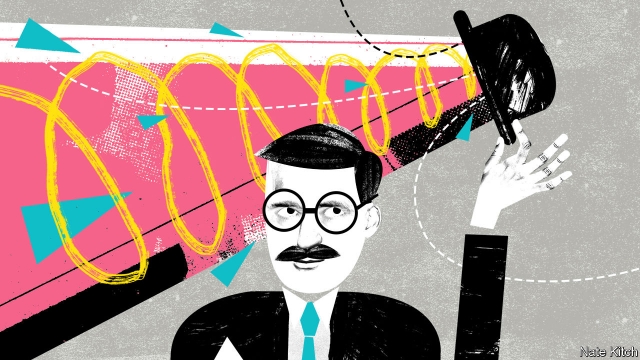
Britain, land of extremes
It’s time to rethink everything we thought we knew about British national character
MORE than most people the British pride themselves on being sensible. Others might go in for such silly things as revolutions and theories. Britons prefer pragmatism to ideology, moderation to extremism, continuity to change. Walter Bagehot praised his fellow-countrymen for their “inconsistent moderation”. George Orwell thought that the essence of Englishness lay in continuity. “It stretches into the future and the past, there is something in it that persists, as in a living creature.” George VI once pronounced that “abroad is bloody”.
The notion that the British are above all sensible makes the current state of politics even more confusing. The country has opted for a leap in the dark in the form of Brexit. The Labour Party has elected a dyed-in-the-wool extremist as leader. This week a former foreign secretary, Boris Johnson, compared women who wear burkas to “letter boxes” and “bank robbers”. How could a sensible country get itself into such a frenzy?
One answer is that the British have never been as sensible as they like to think. Their belief is similar to the American one of being rugged individualists or the French doctrine that all are intellectuals: it conceals a more complicated and interesting reality. Probe the component parts of “sensibleness” (continuity, moderation and pragmatism) and they quickly start to crumble.
Britain does a better job than others of keeping up the idea of national continuity. The queen’s guards continue to parade in bearskins regardless of the sweltering heat or the state of Brexit negotiations. But a look at the efficient rather than the dignified arm of government reveals a more intriguing pattern.
A new book by David Edgerton, “The Rise and Fall of the British Nation”, argues that 20th-century British history is really about rupture and revolution. Britain has seen three distinctive political regimes interrupted by periods of turmoil. In 1900 it displayed a combination of laissez-faire politics and manufacturing prowess. Central government spent about 10% of GDP and most of the work of today’s Whitehall was done by local government or voluntary institutions. Britain was the world’s leading exporter of manufactured goods and the leading producer of battleships and weapons (both Arsenal and West Ham started life as the works football clubs of giant arms-makers). It was also easily the biggest exporter of energy. No fewer than a million people worked in the coalmines.
Clement Attlee’s 1945 Labour government preserved the manufacturing prowess but swept away the commitment to small government and free trade. The welfare state was part of a wider strategy of state planning. The coal, rail, steel, gas and electricity industries were all nationalised. Hundreds of thousands of council houses were built. The gentleman in Whitehall assumed gigantic responsibilities for micro-managing the country. Some 80% of the population called themselves working-class, and the share of manufacturing workers in the labour force rose into the 1950s.
Margaret Thatcher’s 1980s government uprooted things yet again, restoring the laissez-faire tradition (up to a point) but turning its back on the country’s manufacturing might. Britain privatised large swathes of its economy, declared “manufacturing” old hat and gambled its future on services, particularly financial ones. The Thatcherite policy was revolutionary not just in its extent of change but in the costs involved. Large parts of the country remain scarred by de-industrialisation and the marginalisation of a once proud working-class culture.
Such radical shifts were made possible because the British are more ideological and less pragmatic than they like to think. Winston Churchill insisted in going back on the gold standard in 1925 despite its putting the real economy on the rack. Margaret Thatcher repeatedly referred to the writings of Friedrich Hayek and Milton Friedman. Tony Blair refused to avail himself of available brakes to migration from eastern Europe in 2004 because he treated immigration as an ideological matter (proof that he was committed to the double liberalism of free markets and progressive values) rather than as a practical issue with costs and benefits that needed to be weighed against each other.
The notion that Britain is an essentially moderate country is just as hard to defend. It is riven with internal divisions and internecine battles: more Hate Island than Love Island. It is home to one of the best systems for elite academic education in the world and one of the worst for vocational education. It boasts one of the most capitalist markets in the City of London and one of the most socialist in the National Health Service. If London has a claim to be a capital of globalisation, Blackpool has one to be a capital of marginalisation, where 26% of women smoke during pregnancy, compared with less than 2% in Westminster, and male life expectancy is nine years shorter than in Kensington.
The new rules
What are the implications of this today? Two stand out. The first is to forget about many of the “rules” of politics that have long been constructed on the assumption of British sensibleness. The commentators who argue that Labour is on a hiding to nothing in advocating making more things in Britain may be just as wrong as when they argued that the party would never elect as its leader such a radical figure as Jeremy Corbyn.
The second is that the British should not expect normal service to return anytime soon. There are reasons for thinking that Britain is embarking on a period of revolutionary change similar to the 1940s and 1980s, a period that could shape the country’s fate for decades. The parallels with previous eras in ideological flux and political turmoil are uncanny. The big difference is that Britain no longer seems capable of producing political leaders worthy of revolutionary times. In place of Attlee and Thatcher now stand Mr Corbyn and Theresa May.

